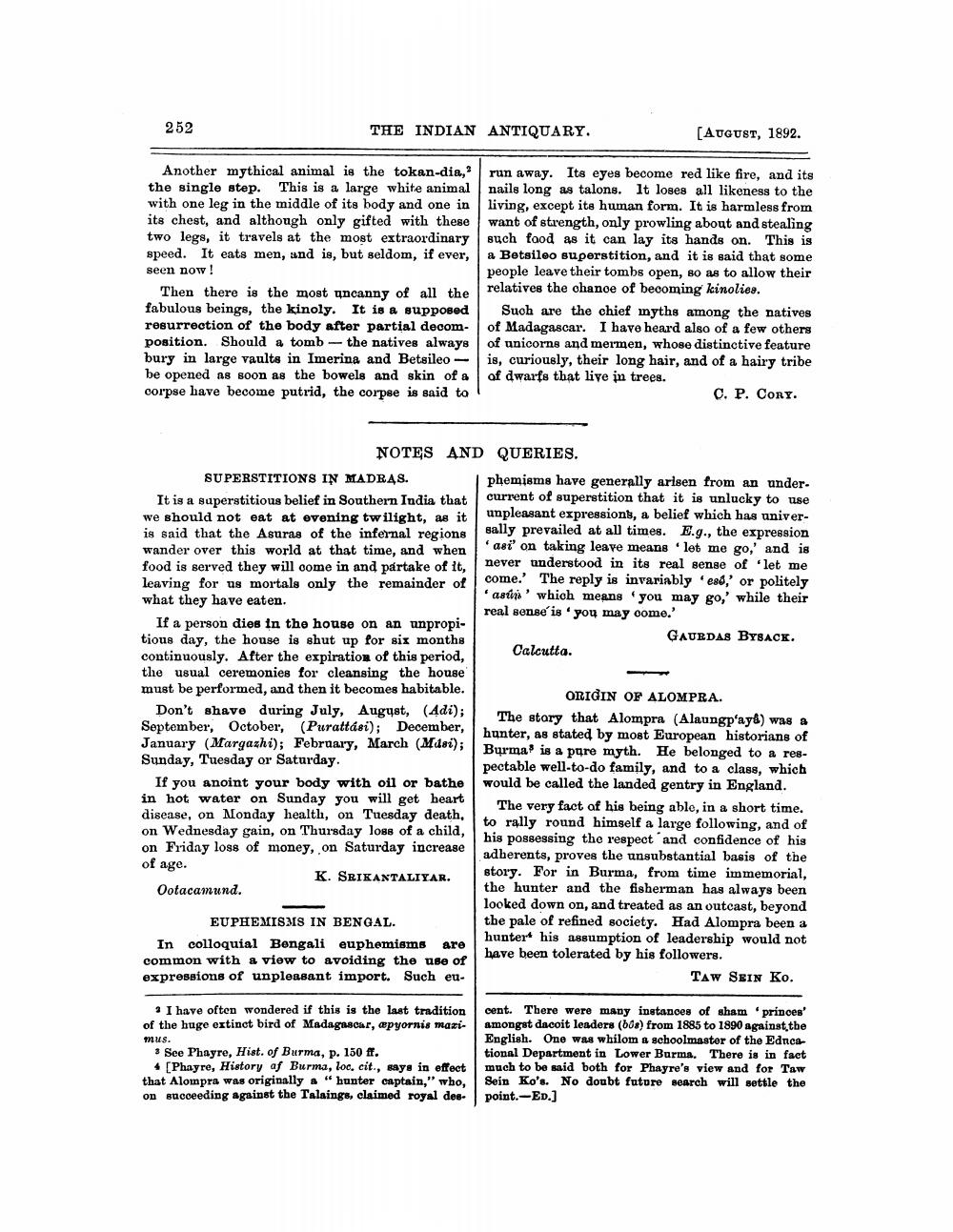________________
252
THE INDIAN ANTIQUARY.
(AUGUST, 1892.
Another mythical animal is the tokan-dia," run away. Its eyes become red like fire, and its the single step. This is a large white animal nails long as talons. It loses all likeness to the with one leg in the middle of its body and one in living, except ite human form. It is harmless from its chest, and although only gifted with these want of strength, only prowling about and stealing two legs, it travels at the most extraordinary such food as it can lay its hands on. This is speed. It eats men, and is, but seldom, if ever, a Betsileo superstition, and it is said that some seen now!
people leave their tombs open, so as to allow their Then there is the most uncanny of all the
relatives the chanoe of becoming kinolios. fabulous beings, the kinoly. It is a supposed Suoh are the chief myths among the natives resurrection of the body after partial decom- of Madagascar. I have heard also of a few others position. Should a tomb - the natives always of unicorns and mermen, whose distinctive feature bury in large vaults in Imerina and Betsileo - is, curiously, their long hair, and of a hairy tribe be opened as soon as the bowels and skin of a of dwarfs that live in trees. oorpse have become putrid, the corpse is said to
C. P. Cory.
NOTES AND QUERIES. SUPERSTITIONS IN MADRAS.
phemisms have generally arisen from an under. It is a superstitious belief in Southern India that current of superstition that it is unlucky to use we should not eat at evening twilight, as it unpleasant expressions, a belief which has univeris said that the Asurns of the infernal regions sally prevailed at all times. E.g., the express wander over this world at that time, and when I asi on taking leave means 'let me go,' and is food is served they will come in and partake of it,
never understood in its real sense of 'let me leaving for us mortals only the remainder of come. The reply is invariably e88,' or politely what they have eaten.
astvin' which means you may go,' while their
real sense'is you may oome.' If a person dies in the house on an unpropitious day, the house is shut up for six months
GAURDAS BYSACK.
Calcutta. continuously. After the expiration of this period, the usual ceremonies for cleansing the house must be performed, and then it becomes habitable.
ORIGIN OF ALOMPRA. Don't shave during July, August, (Adi);
The story that Alompra (Alaungp'ay) was a September, October, (Purattási); December,
hunter, as stated by most European historians of January (Margazhi); February, March (Mdai);
Burma is a pare myth. He belonged to a resSunday, Tuesday or Saturday.
pectable well-to-do family, and to a class, which If you anoint your body with oil or bathe would be called the landed gentry in England. in hot water on Sunday you will get heart
The very fact of his being ablo, in a short time. disease, on Monday health, on Tuesday death,
to rally round himself a large following, and of on Wednesday gain, on Thursday loss of a child,
his possessing the respect and confidence of his on Friday loss of money, on Saturday increase
adherents, proves the unsubstantial basis of the of age. K. SRIKANTALIYAR.
story. For in Burma, from time immemorial, Ootacamund.
the hunter and the fisherman has always been
looked down on, and treated as an outcast, beyond EUPHEMISMS IN BENGAL.
the pale of refined society. Had Alompra been a In colloquial Bengali euphemisms are
hunter his assumption of leadership would not
have been tolerated by his followers. common with a view to avoiding the use of expressions of unpleasant import. Such eu
TAW SEIN Ko.
1 I have often wondered if this is the last tradition of the huge extinct bird of Madagascar, apyornis matimus.
* See Phayre, Hist. of Burma, p. 150 ff.
4 [Phayre, History of Burma, loc. cit., says in effect that Alompra was originally "hunter captain," who, on succeeding against the Talaings, claimed royal des
cent. There were many instances of sham 'princes' amongst dacoit leaders (608) from 1885 to 1890 against the English. One was whilom a schoolmaster of the Ednca tional Department in Lower Burma. There is in fact much to be said both for Phayre's view and for Taw Sein Ko's. No doubt future search will settle the point. -Ed.)




